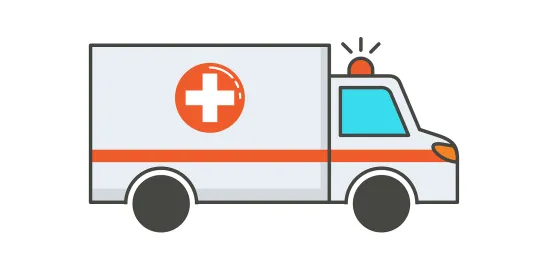Highlights
- HHS-OIG issued a recent favorable opinion on patient billing waivers by an ambulance provider for medical treatment provided at the scene without ambulance transport
- The proposed arrangement is consistent with earlier HHS-OIG guidance issued regarding cost-sharing waivers provided by municipally owned ambulance services
- The proposed arrangement included several factors that limited risk under the civil monetary penalty laws and the Anti-Kickback Statute
The U.S. Department of Health and Human Services’ Office of Inspector General (HHS-OIG) recently released Advisory Opinion No. 24-09, a favorable opinion regarding the federal Anti-Kickback Statute (AKS) and civil monetary penalty laws (CMP) against beneficiary inducements as applied to treatment-in-place (TIP) services provided by 911 emergency services. A large county-owned emergency ambulance service supplier requested the advisory opinion.
TIP Services
In its request, the ambulance supplier proposes to implement a charge for TIP services provided during emergency responses in which there was not a subsequent ambulance transport. The proposed charge would be applied to all patients regardless of their health insurance. It would be limited to emergency responses and not to exceed charges for the same level of care provided with an ambulance transport.
The ambulance supplier proposes to waive cost-sharing amounts on a uniform basis to all patients and accept payment for TIP services from the patient’s health insurance as payment in full.
Presently, neither Medicare Part B nor most state Medicaid programs cover TIP services, except for a few limited Medicare Advantage plans and state Medicaid plans. Therefore, the proposed arrangement would rarely result in federal healthcare program reimbursement.
HHS Concludes Sufficiently Low Risk
The HHS-OIG concluded that the proposed arrangement implicated both the AKS and CMP and would not fall directly within any exception or safe harbor. However, the agency determined the risk of fraud and abuse is sufficiently low and that it would not impose sanctions in connection with the proposed arrangement.
The HHS-OIG cited the following factors as limiting the possibility for fraud and abuse:
- The proposed arrangement uniformly applies its cost-sharing waiver policy for all individuals regardless of payor, thereby reducing the risk to favor certain individuals
- The proposed arrangement ensures it would not balance bill any patients, preventing discrimination among patients based on insurance status
- The proposed arrangement is consistent with past OIG guidance on cost-sharing waivers provided by municipally owned ambulance suppliers for emergency medical services (EMS) ambulance services
- The proposed arrangement would not likely result in increased costs to federal healthcare programs because neither Medicare Part B nor the Medicaid program in the state where the ambulance supplier is located currently cover TIP services
- The proposed arrangement could prevent the need for ambulance transport and subsequent hospital care, thereby potentially reducing costs to federal healthcare programs
- The proposed arrangement may result in patients receiving care quicker and more efficiently at a more appropriate level of care, thus reducing costs to federal healthcare programs
- The proposed arrangement would not likely influence a patient’s decision to use the ambulance supplier for future emergency services, since EMS usage is more likely affected by other factors such as location of the emergency, availability of emergency response services, and decisions made by a 911 dispatcher
As a result of these factors, the HHS-OIG determined the proposed arrangement was low risk and would not impose sanctions on the ambulance supplier in connection with the arrangement.
Key Takeaways
This advisory opinion opens the door for more EMS providers to offer TIP services at no cost to the patient, while still billing patients’ insurance. It also serves as a reminder that the HHS-OIG will show leniency toward arrangements that improve patient care, reduce costs to federal healthcare programs, and do not inappropriately influence patients’ decision-making in choosing providers.
Carén Andrea Oliver also contributed to this article.





 />i
/>i

